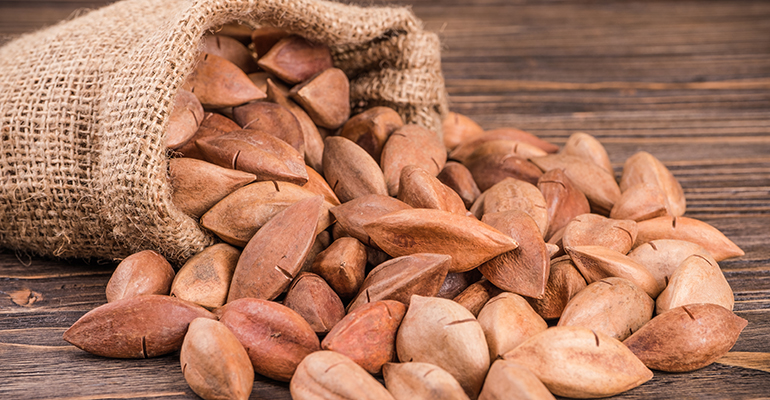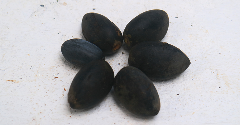High-fat diets fuel interest in pili nuts
24 Jan 2022The popularity of high-fat diets, such as the paleo and ketogenic diet, is fuelling consumer interest in novel sources of healthy fats, such as pili nuts.
Consumer perceptions of the role fat plays in the diet are changing and this is creating demand for novel ingredients, high in perceived healthy fats such as coconut oil, avocado and, more recently, pili nuts.

“Until recently, diets in the US and Canada typically focused on limiting fat rather than increasing it,” says Innova Market Research. “Health experts agree that following a low-fat diet helps lower the risk of developing heart disease, gaining weight, or having certain types of cancers.”
However, the hugely popular Atkins diet promoted a high-protein, high-fat and low-carb diet for weight loss in the nineties and, more recently, the ketogenic diet and palaeolithic diet have risen in popularity for health reasons.
“Trends in weight loss diets and sports nutrition products that limit carbohydrates have changed the focus to higher fat diets in general and ‘phat’ fats in particular,” says Innova. “The premise of the paleo diet – returning to the imagined diet of prehistoric ancestors – emphasizes animal protein sources, nuts, coconut, and fruit oils such as avocado oil, coconut oil, and palm oil. Paleo diets propelled coconut and coconut oil into the ingredient spotlight.”
According to figures from Innova, one in six product launches making a fat-related claim in the US in 2019 carried a keto diet claim, a nearly 300% rise from 2017.
Pili: The ‘Chosen’ nut
New, whole food sources of healthy fat are therefore in-demand. Pili nuts are harvested from the Canarium ovatum tree, which grows in the volcanic soils of south-east Asia. The Philippines is a major producer and the word pili means ‘chosen’ in Tagalog.
Pili nuts are soft with a buttery texture and a delicate, creamy taste, reminiscent of pine nuts. While still relatively unknown in the West, interest is growing in the ingredient as a healthy snack.
Mount Mayon is a Philippines-based company that makes luxury snack packs with a premium positioning, available in three flavours – Himalayan pink salt, Ecuadorian cacao, and Kyoto matcha tea.
US brand Pili Hunters specifically targets the keto and paleo market with prominent front-of-pack claims. Its range includes pili nuts fried in avocado oil and coconut oil.
Use of pili nuts is not limited to the whole nut format and it can also be used in processed products. US start-up Lavva uses pili nuts to make its plant-based milk and yoghurt products, which carry a prominent paleo claim.
‘The lowest-carb nut in nature’
According to Lavva, pili nuts are “the lowest-carb nut in nature” and constitute a complete protein source with all eight essential amino acids. They are also high in monounsaturated fatty acids, which may help to support heart health and brain function.
Lavva cites registered sports dietitian Allison Koch about the health benefits that some of the nutrients in pili nuts, such as magnesium, monounsaturated fats and vitamin E, can bring.
“Pili nuts are a rich source of magnesium, which is essential for nerve and muscle function,” says Koch. “Monounsaturated fats may help reduce bad cholesterol levels in your blood, which can help lower your risk of heart disease and stroke.”
There are also sustainable reasons to buy pili nuts, according to Lavva.
“Pili trees are known as stress crops, meaning the harder the wind blows, the drier the drought, the stronger the monsoon, the more nuts it produces,” it says. “Unlike other tree nuts, Pili trees need nothing more than rainwater to sprout and grow, making them a naturally sustainable and regenerative crop.”
According to the Filipino Department of Agriculture, the Philippines is the only country known for commercial production and processing of pili-based food products and by-products, as of 2015.
Pili nuts are one of the Philippines most important nut tree crop next to cashew, with the Bicol region contributing 80% of the country’s total output volume of pili nuts.
Kenari nuts
Kenari nuts (Canarium Amboinense Hoch) are native to Eastern Indonesia and are in the same family as pili nuts. They have a similar flavour and nutrient profile and similar functionalities.
A novel food application has been submitted to the European Food Safety Authority (EFSA) by Swiss commodity trader Nungesser, which plans to commercialise the nut once novel food status has been approved.
Related news

Chinese food brand wants to give customers ‘the full experience’
16 Dec 2022
Food brand Xiao Chi Jie is revamping Chinese cuisine for the modern American consumer. The Washington-based company sells regional Chinese specialties like soup dumplings, noodle kits, and barbeque skewers direct-to-consumer in the US.
Read more
Regulations spur healthy snacking in Europe
15 Dec 2022
Healthy snack demand is on an upward trajectory in Europe, fuelled by products attaching health halos to their products, according to latest figures by Euromonitor – but regulations may be the real driver.
Read more
Could the EU-Mercosur trade deal be revived?
14 Dec 2022
The re-election of Luiz Inácio da Silva, or Lula, as president of Brazil has prompted speculation that the free-trade agreement between the EU and South American Mercosur bloc could be revived – but the European farming sector has concerns.
Read more
Could menopause-supporting products be the next big opportunity?
13 Dec 2022
As supplement brands launch products to relieve the symptoms of menopausal women such as nutraceutical gummies, the unmet needs of this group is attracting government attention in the UK.
Read more
Plant-based fish and seafood launches around the world
12 Dec 2022
From pea protein-based prawns to microalgae-based tuna alternatives, plant-based alternatives to fish and seafood are on the rise around the world.
Read more
Editors’ choice: Our roundup of the most innovative sweets, snacks and bakery products
9 Dec 2022
The sweets, snacks, and bakery categories are an exciting area, full of fresh and innovative products which are constantly adding meaningful value to the sector.
Read more
Functional food in Japan centres on health and proving claims
8 Dec 2022
The latest Japanese functional food and drink trends put health and product efficacy firmly on the production agenda for new releases.
Read more
Swedish food agency: One in 10 coffee brands contain excess acrylamide
7 Dec 2022
New findings from the Swedish Food Agency have revealed three of 29 coffee products sampled contained acrylamide above limits, reinforcing the link between levels and degree of roasting.
Read more
‘Super nut’? Indonesia’s ‘best kept secret’ wins EU novel food approval
6 Dec 2022
A previously obscure, nutrient-rich Indonesian nut is set to hit European shelves after winning EU novel foods approval that could also help protect under-threat kenari forests on the archipelago.
Read more
Philippines to restrict trans fats in processed foods
5 Dec 2022
Use of artificial trans fats in pre-packed processed foods will be restricted in the Philippines as the country looks to eliminate its consumption from other sources too.
Read more